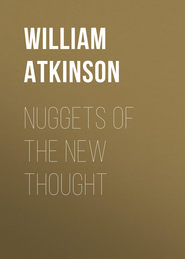По всем вопросам обращайтесь на: info@litportal.ru
(©) 2003-2024.
✖
The Art of Logical Thinking; Or, The Laws of Reasoning
Настройки чтения
Размер шрифта
Высота строк
Поля
Introduction of New Matter, also called Non Sequitur, in which matter is introduced into the conclusion that is not in the premises. Hyslop gives the following example of it: "All men are rational; Socrates is a man; therefore, Socrates is noble." De Morgan gives the following more complex example: "Episcopacy is of Scripture origin; The Church of England is the only Episcopal church in England; therefore, the church established is the church that ought to be supported."
Other fallacies, resembling in some respects those above mentioned, are as follows:
Fallacy of Ambiguous Terms, in which different meanings of the same word are used to produce the fallacious argument. As Jevons says: "A word with two distinct meanings is really two words."
Confusion between Collective and General Meanings of a Term, of which Jevons says: "It would be obviously absurd to argue that because all the books in the British Museum Library are sure to give information about King Alfred, therefore any particular book will be sure to give it. By 'all the books in the British Museum Library,' we mean all taken together. There are many other cases where the confusion is not so evident, and where great numbers of people are unable to see the exact difference."
Arguing from the Collective to the General, in which the fallacy consists of arguing that because something is true of the whole of a group of things, therefore it is true of any of those things. Jevons says: "All the soldiers in a regiment may be able to capture a town, but it is absurd to suppose that therefore every soldier in the regiment could capture the town single handed. White sheep eat a great deal more than black sheep; but that is because there are so many more of them."
Uncertain Meaning of a Sentence, from which confusion arises and fallacious argument may spring. Jevons says: "There is a humorous way of proving that a cat must have three tails: Because a cat has one tail more than no cat; and no cat has two tails; therefore, any cat has three tails." Here the fallacy rests upon a punning interpretation of "no."
Proving the Wrong Conclusion, in which the attempt to confuse conclusions is made, with the result that some people will imagine that the case is established. Jevons says: "This was the device of the Irishman, who was charged with theft on the evidence of three witnesses, who had seen him do it; he proposed to call thirty witnesses who had not seen him do it. Equally logical was the defense of the man who was called a materialist, and who replied, 'I am not a materialist; I am a barber.'"
Fallacy of Unsuccessful Argument, in which is attempted the illogical conclusion that because a certain argument has failed the opposite conclusion is proven. This fallacy is quite common, especially in cases of juries. One side fails to prove certain contentions, and the jury leaps to the conclusion that the opposite contention must be correct. This is clearly fallacious, for there is always the possibility of a third explanation. In the case of a claim of alibi juries are apt to fall into this fallacy. The failure of the attempt to establish an alibi is often held to be in the nature of proof of the guilt of the accused. Old trial lawyers assert that a failure to establish a claimed alibi tends to injure the chance of the accused more than direct evidence against him. Yet, as all logical reasoners will see, there is no logical validity in any such inference. As Jevons has well said: "No number of failures in attempting to prove a proposition really disprove it." At the end of each failure the case simply stands in the same position as before the attempt; i. e., "not proven."
All Violations of the Rules of the Syllogism constitute fallacies, as may be seen by forming a syllogism in violation of one or more of the rules.
The logicians, particularly those of ancient times, took great pains to discover and name new variations of fallacies, many of which were hair-splitting in nature, and not worthy of being considered seriously. Some of those which we have enumerated may possibly be open to the same criticism, but we have omitted many of the worst offenders against practical common sense. An understanding of the fundamental Laws of Reasoning is sufficient to expose and unmask all fallacies, and such understanding is far more valuable than the memorizing of the names of hair-splitting fallacies which would not deceive a child.
In addition to the above stated fallacies of Deductive Reasoning, there are other fallacies which are met with in Inductive Reasoning. Let us briefly consider them.
Hasty and False Generalization is a common fallacy of this class. Persons sometimes see certain qualities in a few individuals of a class, and mistakenly infer that all the individuals in that class must possess these same qualities. Travelers frequently commit this fallacy. Englishmen visiting the United States for a few weeks have been known to publish books upon their return home making the most ridiculous generalizations regarding the American people, their assertions being based upon the observation of a few scattered individuals, often not at all representative. Americans traveling abroad commit similar errors. A flying trip through a country does not afford the proper opportunity for correct generalization. As Brooks says: "No hypothesis should be accepted as true until the facts are so numerous that there can be no doubt of its being proved."
Fallacies of Observation result from incorrect methods of observation among which may be mentioned the following: (1) Careless Observation, or inexact perception and conception; (2) Partial Observation, in which one observes only a part of the thing or fact, omitting the remainder, and thus forming an incomplete and imperfect concept of the thing or fact; (3) Neglect of Exceptions and Contradictory Facts, in which the exceptions and contradictory facts are ignored, thereby giving undue importance to the observed facts; (4) Assumption of Facts which are not real facts, or the assumption of the truth of things which are untrue; (5) Confusing of Inferences with Facts, which is most unwarrantable.
Fallacies of Mistaken Cause result from the assumption of a thing as a cause, when it is not so, of which the following are familiar examples: Substituting the Antecedent for the Cause, which consists in assuming a mere antecedent thing for a cause of another thing. Thus one might assume that the crowing of the cock was the cause of daybreak, because it preceded it; or that a comet was the cause of the plague which followed its appearance; or in the actual case in which a child reasoned that doctors caused deaths, because observation had shown that they always visited persons before they died; or that crops failed because a President of a certain political party had been inaugurated a few months before. Some fallacies of everyday reasoning are quite as illogical as those just mentioned. Substituting the Symptom for the Cause, which consists in assuming as a cause some mere symptom, sign or incident of the real cause. To assume that the pimples of measles were the cause of the disease, would be to commit a fallacy of this kind. We have mentioned elsewhere the fallacy which would assume silk-hats to be the cause of Civilization, instead of being a mere incident of the latter. Politicians are fond of assuming certain incidents or signs of a period, as being the causes of the prosperity, culture and advancement of the period, or the reverse. One might argue, with equal force, that automobiles were the causes of national prosperity, pointing to the fact that the more automobiles to be seen the better the times. Or, that straw hats produced hot weather, for similar reasons.
The Fallacy of Analogy consists in assuming a resemblance or identity, where none exists. We have spoken of this in another chapter. Brooks says, also: "It is a fallacy to carry an analogy too far; as to infer from the parable of the praying of the importunate woman that God resembles the unjust judge."
In conclusion, we would call your attention to the following words from Jevons, in which he expresses the gist of the matter: "It is impossible too often to remind people that, on the one hand, all correct reasoning consists in substituting like things for like things, and inferring that what is true of one will be true of all which are similar to it in the points of resemblance concerned in the matter. On the other hand, all incorrect reasoning consists in putting one thing for another where there is not the requisite likeness. It is the purpose of the rules of deductive and inductive logic to enable us to judge as far as possible when we are thus rightly or wrongly reasoning from some things to others."
FINIS











